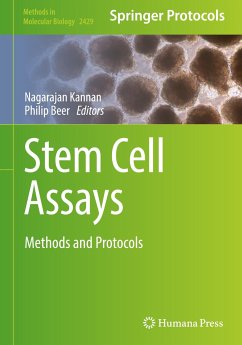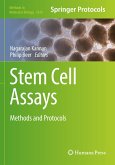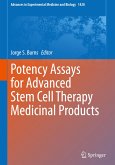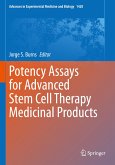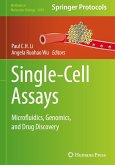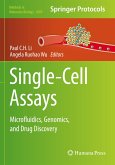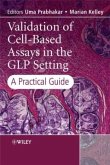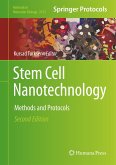Stem Cell Assays
Methods and Protocols
Herausgegeben:Kannan, Nagarajan; Beer, Philip
Stem Cell Assays
Methods and Protocols
Herausgegeben:Kannan, Nagarajan; Beer, Philip
- Gebundenes Buch
- Merkliste
- Auf die Merkliste
- Bewerten Bewerten
- Teilen
- Produkt teilen
- Produkterinnerung
- Produkterinnerung
This volume explores the fields of stem cell biology, regenerative medicine, and cancer biology. The chapters in this book cover topics such as embryonic stem cells (ES) and induced pluripotent cells (iPS); ES/iPSC derived tissue stem cells; tissue resident stem cells; assays for primitive malignant cells; and CRISPR/Cas9 engineering and transgenic model development. Written in the highly successful Methods in Molecular Biology series format, chapters include introductions to their respective topics, lists of the necessary materials and reagents, step-by-step, readily reproducible laboratory…mehr
Andere Kunden interessierten sich auch für
![Stem Cell Assays Stem Cell Assays]() Stem Cell Assays123,99 €
Stem Cell Assays123,99 €![Potency Assays for Advanced Stem Cell Therapy Medicinal Products Potency Assays for Advanced Stem Cell Therapy Medicinal Products]() Potency Assays for Advanced Stem Cell Therapy Medicinal Products123,99 €
Potency Assays for Advanced Stem Cell Therapy Medicinal Products123,99 €![Potency Assays for Advanced Stem Cell Therapy Medicinal Products Potency Assays for Advanced Stem Cell Therapy Medicinal Products]() Potency Assays for Advanced Stem Cell Therapy Medicinal Products123,99 €
Potency Assays for Advanced Stem Cell Therapy Medicinal Products123,99 €![Single-Cell Assays Single-Cell Assays]() Single-Cell Assays154,99 €
Single-Cell Assays154,99 €![Single-Cell Assays Single-Cell Assays]() Single-Cell Assays108,99 €
Single-Cell Assays108,99 €![Validation of Cell-Based Assays in the GLP Setting Validation of Cell-Based Assays in the GLP Setting]() Validation of Cell-Based Assays in the GLP Setting226,99 €
Validation of Cell-Based Assays in the GLP Setting226,99 €![Stem Cell Nanotechnology Stem Cell Nanotechnology]() Stem Cell Nanotechnology116,99 €
Stem Cell Nanotechnology116,99 €-
-
-
This volume explores the fields of stem cell biology, regenerative medicine, and cancer biology. The chapters in this book cover topics such as embryonic stem cells (ES) and induced pluripotent cells (iPS); ES/iPSC derived tissue stem cells; tissue resident stem cells; assays for primitive malignant cells; and CRISPR/Cas9 engineering and transgenic model development. Written in the highly successful Methods in Molecular Biology series format, chapters include introductions to their respective topics, lists of the necessary materials and reagents, step-by-step, readily reproducible laboratory protocols, and tips on troubleshooting and avoiding known pitfalls.
Cutting-edge and thorough, Stem Cell Assays: Methods and Protocols is a valuable laboratory manual that allows researchers and scientists to learn about new techniques and approaches in this developing field.
Cutting-edge and thorough, Stem Cell Assays: Methods and Protocols is a valuable laboratory manual that allows researchers and scientists to learn about new techniques and approaches in this developing field.
Produktdetails
- Produktdetails
- Methods in Molecular Biology 2429
- Verlag: Humana / Springer US / Springer, Berlin
- Artikelnr. des Verlages: 978-1-0716-1978-0
- 1st edition 2022
- Seitenzahl: 588
- Erscheinungstermin: 5. Mai 2022
- Englisch
- Abmessung: 260mm x 183mm x 37mm
- Gewicht: 1288g
- ISBN-13: 9781071619780
- ISBN-10: 1071619780
- Artikelnr.: 62358547
- Herstellerkennzeichnung Die Herstellerinformationen sind derzeit nicht verfügbar.
- Methods in Molecular Biology 2429
- Verlag: Humana / Springer US / Springer, Berlin
- Artikelnr. des Verlages: 978-1-0716-1978-0
- 1st edition 2022
- Seitenzahl: 588
- Erscheinungstermin: 5. Mai 2022
- Englisch
- Abmessung: 260mm x 183mm x 37mm
- Gewicht: 1288g
- ISBN-13: 9781071619780
- ISBN-10: 1071619780
- Artikelnr.: 62358547
- Herstellerkennzeichnung Die Herstellerinformationen sind derzeit nicht verfügbar.
Rapid and Highly Efficient Isolation and Purification of Human Induced Pluripotent Stem Cells.- Artificial Activation of Murine Oocytes using Strontium to Derive Haploid and Diploid Parthenotes.- Generation of Human iPSC from Small Volume Peripheral Blood Samples.- Distinguishing between Endodermal and Pluripotent Stem Cell Lines during Somatic Cell Reprogramming.- Measuring Early Germ-Layer Specification Bias in Human Pluripotent Stem Cells.- Detection of Soluble and Insoluble Protein Species in Patient-Derived iPSCs.- Extracellular Flux Analysis of Mitochondrial Function in Pluripotent Stem Cells.- Assessment of Endothelial-to-Hematopoietic Transition of Individual Hemogenic Endothelium and Bulk Populations in Defined Conditions.- Homogenous Differentiation of Functional Hepatocytes from Human Induced Pluripotent Stem Cells.- Differentiation of Human Induced Pluripotent Stem Cells into Cortical Neurons to Advance Precision Medicine.- Differentiation of iPS-Cells into Peripheral Sensory Neurons.- Culture of Human iPSC-Derived Motoneurons in Compartmentalized Microfluidic Devices and Quantitative Assays for Studying Axonal Phenotypes.- iPS Cell-Differentiation into Brain Microvascular Endothelial Cells.- Chromatin Immunoprecipitation in Human Pluripotent Stem Cell-Derived 3D Organoids to Analyze DNA-Protein Interactions.- Generation of Embryonic Origin-Specific Vascular Smooth Muscle Cells from Human Induced Pluripotent Stem Cells.- Generation of Salivary Gland Organoids from Mouse Embryonic Stem Cells.- In Vitro Generation of Heart Field Specific Cardiomyocytes.- Isolation and Characterization of Extracellular Vesicles Derived from Human Umbilical Cord Mesenchymal Stem Cells.- Identification and Validation of CRISPR/Cas9 Off-Target Activity in Hematopoietic Stem and Progenitor Cells.- Genome Engineering of Hematopoietic Stem Cells using CRISPR/Cas9 System.- Generation of Rat Neural Stem Cells to Produce Different Astrocyte Phenotypes.- In Situ Quantification and Isolation of Müller Glial Cells by Fluorescence Activated Cell Sorting from the Regenerating Larval Zebrafish Retina.- Quantification and Cloncal Culture of Neural Stem Cells from the Hippocampus of Adult Mouse.- Reprogramming Mouse Oviduct Epithelial Cells using In Vivo Electroporation and CRISPR/Cas9 Mediated Genetic Manipulation.- Generation of Human Liver Chimeric Mice and Harvesting of Human Hepatocytes from Mouse Livers.- Application of 3D Culture Assays to Study Breast Morphogenesis, Epithelial Plasticity, and Cellular Interactions in an Epithelial Progenitor Cell Line.- A Unified Protocol to Streamline Molecular and Cellular Analysis for Three-Dimensional Cell Cultures.- Mesenchymal Stem Cell Seeding on 3D Scaffolds.- Assaying Candidate Human Skin Keratinocyte Stem Cells by Determining their Long-Term Serial Proliferative Output in Culture.- Protocol for the Detection of Organoid-Initiating Cell Activity in Patience-Derived Single Fallopian Tube Epithelial Cells.- Quantification of Mucle Stem Cell Differentiation using Live-Cell Imaging and Eccentricity Measures.- The Enrichment of Breast Cancer Stem Cells from MCF7 Breast Cancer Cell Line using Spheroid Culture Technique.- Assessment of Breast Cancer Stem Cell Activity using a Spheroid Formation Assay.- Enrichment of Cancer Stem Cells in a Tumor Sphere Assay.- In Vitro Quantification of Cancer Stem Cells using a Mammosphere Formation Assay.- Designing Genetically Engineered Mouse Models (GEMMSs) using CRISPS Mediated Genome Editing.- Assays for the Spectrum of Circulating Tumor Cells.- Limiting Dilution Tumor Initiation Assay: An In Vitro Approach for the Study of Cancer Stem Cells.- Orthotopic Xenografts of Colorectal Cancer Stem Cells.
Rapid and Highly Efficient Isolation and Purification of Human Induced Pluripotent Stem Cells.- Artificial Activation of Murine Oocytes using Strontium to Derive Haploid and Diploid Parthenotes.- Generation of Human iPSC from Small Volume Peripheral Blood Samples.- Distinguishing between Endodermal and Pluripotent Stem Cell Lines during Somatic Cell Reprogramming.- Measuring Early Germ-Layer Specification Bias in Human Pluripotent Stem Cells.- Detection of Soluble and Insoluble Protein Species in Patient-Derived iPSCs.- Extracellular Flux Analysis of Mitochondrial Function in Pluripotent Stem Cells.- Assessment of Endothelial-to-Hematopoietic Transition of Individual Hemogenic Endothelium and Bulk Populations in Defined Conditions.- Homogenous Differentiation of Functional Hepatocytes from Human Induced Pluripotent Stem Cells.- Differentiation of Human Induced Pluripotent Stem Cells into Cortical Neurons to Advance Precision Medicine.- Differentiation of iPS-Cells into Peripheral Sensory Neurons.- Culture of Human iPSC-Derived Motoneurons in Compartmentalized Microfluidic Devices and Quantitative Assays for Studying Axonal Phenotypes.- iPS Cell-Differentiation into Brain Microvascular Endothelial Cells.- Chromatin Immunoprecipitation in Human Pluripotent Stem Cell-Derived 3D Organoids to Analyze DNA-Protein Interactions.- Generation of Embryonic Origin-Specific Vascular Smooth Muscle Cells from Human Induced Pluripotent Stem Cells.- Generation of Salivary Gland Organoids from Mouse Embryonic Stem Cells.- In Vitro Generation of Heart Field Specific Cardiomyocytes.- Isolation and Characterization of Extracellular Vesicles Derived from Human Umbilical Cord Mesenchymal Stem Cells.- Identification and Validation of CRISPR/Cas9 Off-Target Activity in Hematopoietic Stem and Progenitor Cells.- Genome Engineering of Hematopoietic Stem Cells using CRISPR/Cas9 System.- Generation of Rat Neural Stem Cells to Produce Different Astrocyte Phenotypes.- In Situ Quantification and Isolation of Müller Glial Cells by Fluorescence Activated Cell Sorting from the Regenerating Larval Zebrafish Retina.- Quantification and Cloncal Culture of Neural Stem Cells from the Hippocampus of Adult Mouse.- Reprogramming Mouse Oviduct Epithelial Cells using In Vivo Electroporation and CRISPR/Cas9 Mediated Genetic Manipulation.- Generation of Human Liver Chimeric Mice and Harvesting of Human Hepatocytes from Mouse Livers.- Application of 3D Culture Assays to Study Breast Morphogenesis, Epithelial Plasticity, and Cellular Interactions in an Epithelial Progenitor Cell Line.- A Unified Protocol to Streamline Molecular and Cellular Analysis for Three-Dimensional Cell Cultures.- Mesenchymal Stem Cell Seeding on 3D Scaffolds.- Assaying Candidate Human Skin Keratinocyte Stem Cells by Determining their Long-Term Serial Proliferative Output in Culture.- Protocol for the Detection of Organoid-Initiating Cell Activity in Patience-Derived Single Fallopian Tube Epithelial Cells.- Quantification of Mucle Stem Cell Differentiation using Live-Cell Imaging and Eccentricity Measures.- The Enrichment of Breast Cancer Stem Cells from MCF7 Breast Cancer Cell Line using Spheroid Culture Technique.- Assessment of Breast Cancer Stem Cell Activity using a Spheroid Formation Assay.- Enrichment of Cancer Stem Cells in a Tumor Sphere Assay.- In Vitro Quantification of Cancer Stem Cells using a Mammosphere Formation Assay.- Designing Genetically Engineered Mouse Models (GEMMSs) using CRISPS Mediated Genome Editing.- Assays for the Spectrum of Circulating Tumor Cells.- Limiting Dilution Tumor Initiation Assay: An In Vitro Approach for the Study of Cancer Stem Cells.- Orthotopic Xenografts of Colorectal Cancer Stem Cells.

